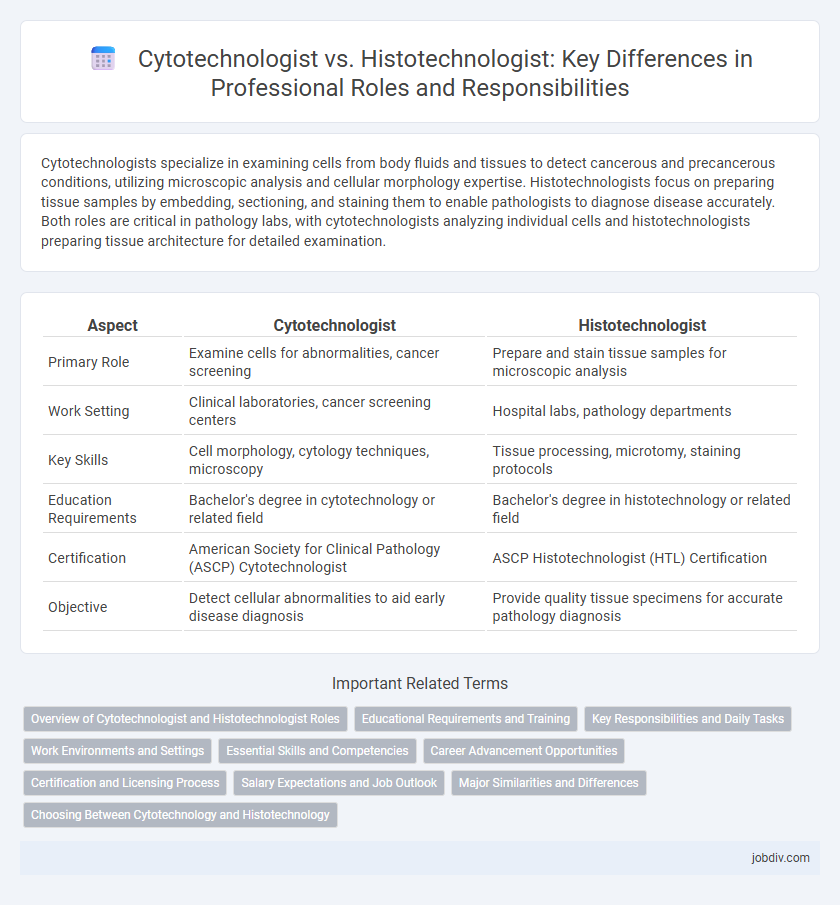Cytotechnologists specialize in examining cells from body fluids and tissues to detect cancerous and precancerous conditions, utilizing microscopic analysis and cellular morphology expertise. Histotechnologists focus on preparing tissue samples by embedding, sectioning, and staining them to enable pathologists to diagnose disease accurately. Both roles are critical in pathology labs, with cytotechnologists analyzing individual cells and histotechnologists preparing tissue architecture for detailed examination.
Table of Comparison
| Aspect | Cytotechnologist | Histotechnologist |
|---|---|---|
| Primary Role | Examine cells for abnormalities, cancer screening | Prepare and stain tissue samples for microscopic analysis |
| Work Setting | Clinical laboratories, cancer screening centers | Hospital labs, pathology departments |
| Key Skills | Cell morphology, cytology techniques, microscopy | Tissue processing, microtomy, staining protocols |
| Education Requirements | Bachelor's degree in cytotechnology or related field | Bachelor's degree in histotechnology or related field |
| Certification | American Society for Clinical Pathology (ASCP) Cytotechnologist | ASCP Histotechnologist (HTL) Certification |
| Objective | Detect cellular abnormalities to aid early disease diagnosis | Provide quality tissue specimens for accurate pathology diagnosis |
Overview of Cytotechnologist and Histotechnologist Roles
Cytotechnologists specialize in examining cells under a microscope to detect cancer, infections, and other abnormalities, playing a critical role in early disease diagnosis through microscopic analysis. Histotechnologists prepare and process tissue samples by sectioning and staining them to ensure high-quality slides for pathologists to examine tissue structure and cellular details. Both professions require expertise in laboratory techniques and contribute significantly to pathology departments and diagnostic laboratories.
Educational Requirements and Training
Cytotechnologists typically require a bachelor's degree in cytotechnology or a related biological science, coupled with specialized training in microscopic examination of cells, often obtained through accredited cytotechnology programs. Histotechnologists generally hold a bachelor's degree in histotechnology or medical laboratory science, receiving hands-on training in tissue preparation, staining techniques, and microscopy via formal histotechnology certification programs. Both professions mandate passing a certification exam, such as the ASCP Board of Certification, to ensure proficiency and adherence to industry standards.
Key Responsibilities and Daily Tasks
Cytotechnologists specialize in examining cellular samples to detect abnormalities and diagnose diseases such as cancer through microscopic analysis of Pap smears and other cytological specimens. Histotechnologists prepare tissue samples for microscopic examination by processing, embedding, sectioning, and staining biopsies to assist pathologists in diagnosing various medical conditions. Both professionals play critical roles in diagnostic laboratories but focus on different specimen types and laboratory techniques to support accurate disease diagnosis.
Work Environments and Settings
Cytotechnologists primarily work in clinical laboratories, hospitals, and research institutions where they analyze cell samples for disease detection, often using microscopes and advanced imaging technologies. Histotechnologists operate in similar environments but focus on preparing tissue specimens for microscopic examination, working closely with pathology labs and surgical centers to aid in diagnosis. Both professionals play critical roles in medical diagnostics, with their work settings emphasizing precision, sterile conditions, and collaboration with healthcare teams.
Essential Skills and Competencies
Cytotechnologists must excel in microscopic analysis, identifying cellular abnormalities with precision and strong attention to detail, essential for early cancer detection. Histotechnologists are proficient in tissue preparation techniques, including embedding, sectioning, and staining, requiring dexterity and technical expertise to produce high-quality slides for pathological examination. Both professionals demonstrate critical lab skills, strong understanding of anatomy and pathology, and the ability to maintain strict quality control protocols in clinical environments.
Career Advancement Opportunities
Cytotechnologists often advance by specializing in cancer detection techniques and pursuing roles in research or education within cytopathology laboratories. Histotechnologists may progress by developing expertise in tissue preparation technologies, moving into supervisory positions, or engaging in quality control and regulatory compliance roles in clinical or industrial settings. Both careers offer opportunities for certification advancement and leadership in diagnostic pathology services.
Certification and Licensing Process
Cytotechnologists obtain certification through the American Society for Clinical Pathology (ASCP) Board of Certification, requiring completion of an accredited cytotechnology program and passing a rigorous exam. Histotechnologists also pursue ASCP certification, necessitating graduation from an accredited histotechnology program and successful examination to demonstrate proficiency in tissue preparation and staining. Both professionals must fulfill state-specific licensing requirements, which vary but typically include holding ASCP certification and completing continuing education credits to maintain licensure.
Salary Expectations and Job Outlook
Cytotechnologists typically earn an average salary between $65,000 and $85,000 annually, with a strong demand driven by advancements in cancer screening technologies. Histotechnologists see median salaries ranging from $55,000 to $75,000, supported by ongoing growth in medical research and pathology labs. Both professions exhibit positive job outlooks, but cytotechnologists may experience faster employment growth due to increasing reliance on microscopic cancer detection.
Major Similarities and Differences
Cytotechnologists and Histotechnologists both specialize in analyzing human tissues to detect diseases, yet cytotechnologists primarily examine individual cells for abnormalities such as cancer, while histotechnologists prepare tissue samples by embedding, sectioning, and staining for microscopic evaluation. Both professions require strong knowledge of cellular biology, pathology, and laboratory techniques, but cytotechnologists often focus on microscopic cellular details, whereas histotechnologists handle specimen preparation and processing. Certification exams for each role, such as those offered by the American Society for Clinical Pathology (ASCP), emphasize their distinct skill sets and clinical applications within diagnostic laboratories.
Choosing Between Cytotechnology and Histotechnology
Choosing between cytotechnology and histotechnology depends on your interest in cellular analysis versus tissue examination; cytotechnologists specialize in detecting cellular abnormalities to aid in disease diagnosis, especially cancer, while histotechnologists focus on preparing tissue samples for microscopic evaluation. Career pathways differ, with cytotechnologists often working closely with pathologists to screen for malignancies in Pap smears and body fluids, and histotechnologists operating advanced laboratory equipment to stain and section biopsies. Consider factors such as preferred laboratory techniques, interaction with clinical teams, and certification requirements when deciding the optimal profession between these two specialized medical laboratory science fields.
Cytotechnologist vs Histotechnologist Infographic

 jobdiv.com
jobdiv.com